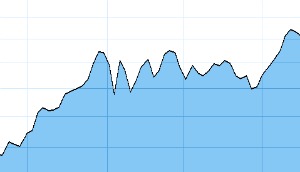After a chamber music master class, someone mentioned that if the students didn’t sound better at the end of the session — it must not have been a very good master class.
 We want musicians to improve. But, how quickly? Can we assess progress after half an hour, at the end of a concert season, or a 4-year degree?
We want musicians to improve. But, how quickly? Can we assess progress after half an hour, at the end of a concert season, or a 4-year degree?
In the master class, one student pianist was asked to play a difficult passage faster — not to take extra time to negotiate its considerable technical difficulties. He couldn’t do it, on the spot. (Slowing down had allowed all the notes to be played, while perhaps changing the character of the music.)
Diving into a home repair project, a relative of mine needed a particular type of wood screw. With no hope of obtaining the screw before bedtime, he used a nail. The job was finished. All done!
At an early stage of learning a new piece, some pianists write in fingerings. Later, written-in fingerings might help them remember what was done. And written fingering may expedite initial learning by making physical finger patterns consistent. Perhaps counterintuitively, I was taught to make no marks in my scores. Not even fingerings! As a result, when I return to music I’ve played it takes me a while to remember. And sometimes my hand (or some “inner hand”) has discovered a more coherent and less obvious solution than what I would have written earlier.
Isn’t it a sign of emotional maturity to be able to hold conflicts without needing to resolve them right away?
Different from normal medical care, emergency room medicine may save your life, in a few minutes. That doesn’t make it the best way to provide regular health care.
As musicians, our pragmatic desire for quick improvement can be balanced by focussing on the highest level of aspiration — goals that may take a very long time, or even be impossible to reach. Some quick fixes foreclose the possibility of meeting especially difficult or nuanced challenges.
Stock market “day traders” liquidate whatever positions they’ve taken, each day before the closing bell. They are fully “in cash” every night. There are many unforeseeable risks that effect the value of an investment during the market’s off-hours. Perhaps it’s too dangerous to be holding anything when the market’s not available to cash out? For these guys, every plan must be finished right away — every question answered. For day traders, holding an open position is just too risky.
For artists it may be the opposite. For most artists, great risk comes from finishing tasks too quickly (with shortcuts?), or from insisting on finding solutions to every challenge by the end of the day’s work.

“As musicians, our pragmatic desire for quick improvement can be balanced by focussing on the highest level of aspiration…”
Bull’s-eye. Art is long, life short.
Wonderful piece.
midwest